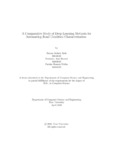A comparative study of deep learning methods for automating road condition characterization
Abstract
Roads in Bangladesh provide infrastructural facilities to both agricultural as well as industrial sectors of the country. Distressed roads can cause fatal accidents as well as largely decelerate sector progress. This makes swift road inspection and repairs one of the most important aspects of our country’s holistic growth. As much as it affects the general public, tackling this is as big a problem for the government as well. Currently, the problem for road repair is a multi-stage problem, which involves getting a complaint from a resident, physical road inspection by some official, identifying the type of damage and then comes the process of actually repairing it. Here, we intend to make this cumbersome process simpler, by automating the problem identification stage. We developed a method leveraging the Machine Learning and Deep Learning capabilities that can potentially detect a damaged road and identify the type of damage viz. pothole and crack. We self-captured data from the roads and streets, thus emulating the data we expect when this method is used in real-life by installing cameras on the city corporation’s garbage trucks. We reviewed various models ranging from conventional machine learning to complex deep learning algorithms and ultimately shortlisted three models: CNN, CNN-XGboost, and ResNet. These three models were then optimized for our problem, and then extensive testing was performed to determine the one that outperforms the rest. ResNet-34 emerged as a clear winner, with an accuracy of 87.8 % on the test data. Here, we’ll do an in-depth study of the efficacy of these models on our problem statement.

